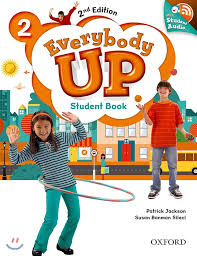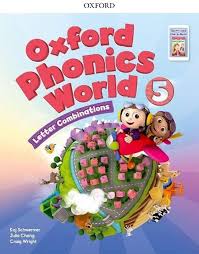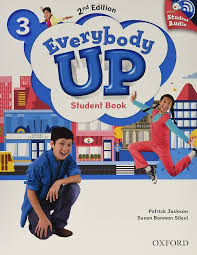That’s an English coursebook series by Oxford University Press, commonly used in elementary schools. The Level 2 book includes:
Student Book
Workbook
Teacher’s Book
Class Audio and Video resources
Online Practice (Oxford Online Learning Zone)
I can help you with things like:
Unit summaries or vocabulary lists
Grammar points covered
Activity ideas or teaching plans
Download or access links (official sources only)
Answer keys or listening scripts (if available from legitimate sources)
Features Details:
1. Vocabulary Lists 📚
Each unit in the Everybody Up series focuses on practical vocabulary. Here’s an overview of some common categories:
Unit 1: Greetings & Personal Information
Vocabulary: Hello, How are you?, My name is, What’s your name?, I’m from…
Focus: Basic introductions, countries, nationalities, age.
Unit 2: Classroom Objects
Vocabulary: Pen, pencil, ruler, desk, chair, book, eraser.
Focus: School-related items.
Unit 3: Family & Friends
Vocabulary: Mother, father, brother, sister, aunt, uncle, cousin, friend.
Focus: Family members, basic relationships.
Unit 4: Daily Routines
Vocabulary: Wake up, eat breakfast, go to school, play, sleep, brush teeth.
Focus: Common daily activities, time expressions.
Each unit also features additional words and phrases, but these are the core themes.
2. Grammar Focus 🧑🏫
Here are some of the grammar topics covered in Level 2:
Present Simple (affirmative & negative)
Example: “I wake up at 7:00 AM.” vs “I don’t wake up at 6:00 AM.”
There is / There are
Example: “There is a book on the table.” / “There are five pencils in the box.”
Have / Has (affirmative & negative)
Example: “She has a dog.” vs “He doesn’t have a cat.”
Prepositions of place
Example: “The cat is under the table.” / “The books are on the shelf.”
Wh- Questions
Examples: “What time is it?” / “Where is your school?” / “How old are you?”
3. Workbook Answers ✏️
The Workbook provides exercises to reinforce the learning from the Student Book. Common exercises include:
Fill-in-the-blanks with correct vocabulary or grammar forms.
Matching activities: Match the words with pictures or definitions.
Short-answer questions based on reading passages.
Unfortunately, I can’t provide the full answers here, but you can check the Teacher’s Book for the answer key.
4. Teacher’s Resources 📝
The Teacher’s Book includes:
Lesson plans for each unit
Activity ideas and games for making lessons fun and interactive
Audio scripts for listening exercises
Assessments to track students’ progress
It’s basically a step-by-step guide for teaching each unit.
5. Class Audio & Video 🔊🎥
Audio: Each unit has listening activities. You can find these on the Oxford University Press website or through the Oxford Online Learning Zone.
Video: There are also short videos to help with listening comprehension and real-world context.
6. Online Practice 🌐
Oxford Online Learning Zone (if you have access to it) provides interactive activities, flashcards, quizzes, and additional practice for students.










Reviews
There are no reviews yet.